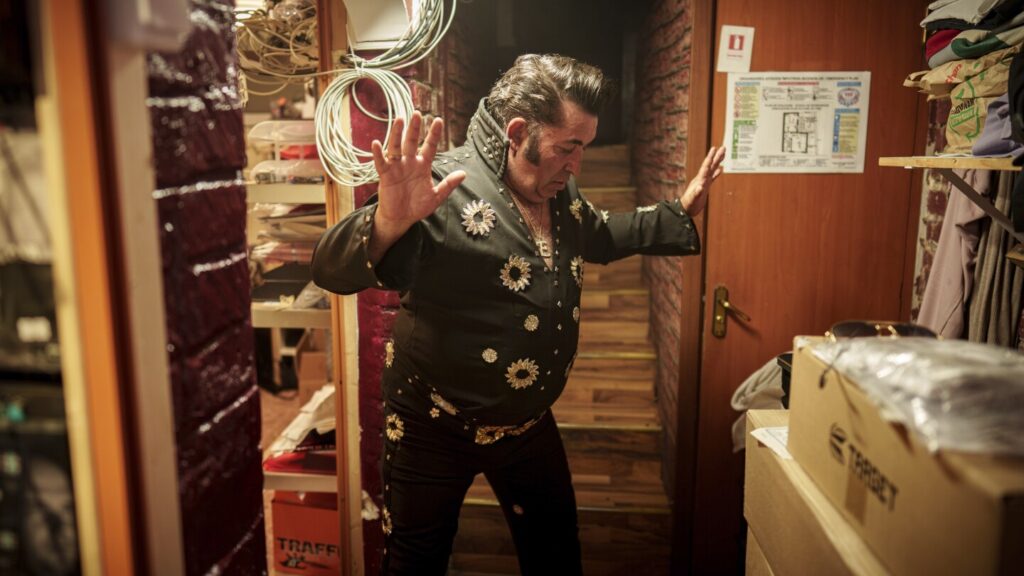BUCHAREST, Romania (AP) — Tudor Lakatos is fighting discrimination against the Roma people, one Elvis Presley song at a time.
Decked out in a rhinestone shirt and oversized sunglasses, with his black hair slicked back into a 1950s-style quiff, Lakatos swivels his hips and belts out his own idiosyncratic versions of hits like “Blue Suede Shoes” at venues throughout Romania.
But don’t call him an Elvis impersonator. Lakatos prefers to say that he “channels” the King of rock ‘n’ roll’s global appeal to break down stereotypes about the Roma and provide a positive role model for Roma children.
“I never wanted to get on stage, I didn’t think about it,” Lakatos, 58, said after a recent gig at a restaurant in the capital, Bucharest. “I only wanted one thing — to make friends with Romanians, to stop being called a Gypsy,″ he added, using an often derided term for people belonging to the Roma ethnic group.
A customer records video as Tudor Lakatos, right, who goes by the stage name Elvis Rromano, performs at the Terasa Florilor restaurant, along with Nicolae Feraru, left, and Stefan Marin, center, of the Taraful Frunzelor band, in Bucharest, Romania, Friday, June 20, 2025.(AP Photo/Vadim Ghirda)
The Roma, an ethnic group that traces its roots to South Asia, have been persecuted across eastern Europe for centuries and are still associated with high rates of poverty, unemployment and crime. They account for about 7% of the population of Romania, where a fifth say they have faced discrimination in the past year, according to a recent survey by the European Union.
Lakatos’ quest to change that began in the early 1980s when he was an art student and Romania was ruled by the hard-line communist regime of Nicolae Ceausescu.
At a time when anti-Roma discrimination was mainstream, Lakatos found that singing Elvis songs was a way to connect with ethnic Romanian students while rock music was a symbol of rebellion against the oppressive government.
Four decades later, he’s added a new audience.
Tudor Lakatos, who goes by the stage name Elvis Rromano, poses outside the Terasa Florilor restaurant before a performance in Bucharest, Romania, Friday, June 20, 2025. (AP Photo/Andreea Alexandru)
A school teacher for the past 25 years, Lakatos uses his music to show his students that they can aspire to something more than the dirt roads and horse driven carts of their village in northwestern Romania.
“The adjective Gypsy is used everywhere as a substitute for insult,” Lakatos said. “We older people have gotten used to it, we can swallow it, we grew up with it. I have said many times, ‘Call us what you want, dinosaur and brontosaurus, but at least join hands with us to educate the next generation.’”
But Lakatos still crisscrosses the country to perform at venues large and small.
On a hot summer evening, that journey took Lakatos to Terasa Florilor in Bucharest, a neighborhood joint whose owner takes pride in offering live music by local artists who perform on a stage made of wooden beams painted in vivid colors.
Customers dance as Tudor Lakatos, who goes by the stage name Elvis Rromano, performs at the Terasa Florilor restaurant with the Taraful Frunzelor band, in Bucharest, Romania, Friday, June 20, 2025. (AP Photo/Andreea Alexandru)
The audience included those who came for the show and others attracted by the sausages, pork roast and Moldavian meatballs on the menu. A few danced and others took selfies as they enjoyed Lakatos’ trademark “Rock ’n’ Rom” show, a mix of Elvis songs delivered in the Romani language, Romanian and English.
The eclectic mix of languages can sometimes lead to surprises because there isn’t always a literal translation for Elvis’ 1950s American English.
For example, “Don’t step on my blue suede shoes” doesn’t make sense to many of the children he teaches because they are so poor, Lakatos said.
In his version, the lyric Elvis made famous becomes simply “don’t step on my bare feet.”
It’s a message that Elvis — born in a two-room house in Tupelo, Mississippi, during the Great Depression — probably would have understood.

